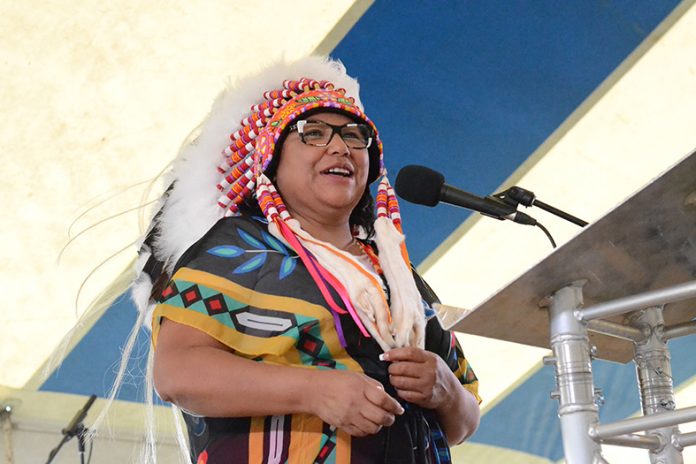
The Peter Ballantyne Cree Nation (PBCN) says it’s in need of long-term funding to tackle root causes of crime.
PBCN declared a state of emergency on Tuesday after the alleged murder of a 17-year-old boy in Deschambault Lake.
One of the accused is also a youth. She cannot be identified due to her age and Deschambault’s small population of about 1,500.
“It’s just not right to be losing our young people this way. There’s a better life,” said Chief Karen Bird.
“We’ve had enough. We need to make a big deal of this now. It needs to be heard what we’re going through.”
Bird said PBCN has been holding daily meetings since the homicide on Oct. 1.
The declaration allows PBCN to establish an emergency operations centre, consisting of health care staff and external partners. Bird said leadership is meeting with Indigenous Services Canada “in the coming days” to discuss the need for additional public safety personnel and infrastructure.
Bird said PBCN receives funding as if it’s one community, rather than eight separate communities: Deschambault Lake, Southend, Sturgeon Landing, Prince Albert, Amisk Lake, Kinoosao, Pelican Narrows and Sandy Bay.
Bird said that leaves PBCN underfunded. Not only because resources are being split between eight communities, but because the issues present in one area are different than the next.
“Our plan is to increase the presence of law enforcement, community outreach programs and collaboration with external partners, agencies to address the root causes of violence,” she said.
One of those issues is housing.
For all of PBCN, Bird explained, there’s only 907 homes for 12,300 people. Aside from having nowhere to call home, she said there’s a lack of employment, education and recreation opportunities.
“It’s getting to the point where people are living with anxiety 24/7 now and it’s not a safe environment,” she said, adding that the RCMP are a crucial part of improvement.
“We do have challenges where officials or RCMP come to our communities and they leave in two years. We need a better relationship with them.”
Brian Hardlotte, grand chief of the Prince Albert Grand Council, echoed the need for better relationships between chief and council, inter-agencies, police and the provincial and federal governments.
“We can’t achieve anything unless we break that communication gap,” he said.
Vice-Chief Christopher Jobb said the PAGC is working towards preventative solutions to crime, opposed to reactive. This especially applies in communities that don’t have municipalities close by.
“We need to pass by these hurdles in order to move forward because every life matters in our communities,” said Jobb.
Bird said the state of emergency will remain in place until chief and council is “confident that safety benchmarks have been met.”
This is the third state of emergency in PBCN in less than a year. In response, leadership has developed a wellness group that’s currently focusing on the most extreme needs.

